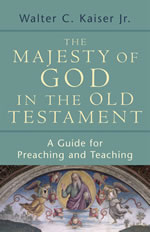Book Review—The Majesty of God in the Old Testament
by Andy Efting
Kaiser, Walter C., Jr. The Majesty of God in the Old Testament: A Guide for Preaching and Teaching. Grand Rapids, MI: Baker Academic, 2007. 174 pages. $16.99
(Review copy courtesy of Baker Academic) Purchase: Baker | CBD | Amazon | WTS
Purchase: Baker | CBD | Amazon | WTS
Special Features: Bibliographic references and index
ISBNs: 080103244X / 97800801032448
LCCN: BT130.K35 2007
DCN: 231’.4—dc22
Subjects: Preaching, Old Testament
Read an excerpt. Walter C. Kaiser (Ph.D., Brandeis University) is president emeritus and Colman Mockler Distinguished Professor of Old Testament at Gordon-Conwell Theological Seminary. He is the author of more than 30 books, including Mission in the Old Testament and Preaching and Teaching from the Old Testament.
Walter C. Kaiser (Ph.D., Brandeis University) is president emeritus and Colman Mockler Distinguished Professor of Old Testament at Gordon-Conwell Theological Seminary. He is the author of more than 30 books, including Mission in the Old Testament and Preaching and Teaching from the Old Testament.
In his classic book, The Knowledge of the Holy, A.W. Tozer says the following:
The most portentous fact about any man is not what he at a given time may say or do, but what he in his deep heart conceives God to be like. We tend by a secret law of the soul to move toward our mental image of God… . Always the most revealing thing about the Church is her idea of God, just as her most significant message is what she says about Him or leaves unsaid, for her silence is often more eloquent than her speech.
If this is true—and I believe it is—then what does it say about the church today and about her basic neglect of the self-disclosure of God found in the Old Testament? Except for a handful of well-known Sunday school stories, the Old Testament remains a closed book for many Christians today. Thus I am always encouraged when a new book comes on the scene that helps open up the Old Testament to modern-day believers and especially one that should appeal to a wide range of reading audiences. Walter Kaiser’s The Majesty of God in the Old Testament is exactly such a book and one that deals specifically with what Tozer described as the indispensible knowledge of the Holy.
My previous experience with Kaiser, whose writings I have greatly enjoyed and profited from, led me to expect another book full of sustained, fairly advanced, technical analysis of the Old Testament text targeted at well-educated readers and seminarians. This present volume, though full of sound exegesis, is written with a much broader audience in mind. At times, it is almost colloquial in style and is definitely accessible to the average Christian. In producing such a work, Kaiser demonstrates his skill as a master teacher, someone who, as I heard R.C. Sproul explain once, simplifies the profound and complex without distortion. This volume definitely qualifies. As such, it would make a fine teacher’s guide for a series on the majesty of God for either teens or adults. In fact, I would highly recommend it.
In his book, Kaiser selects 10 Old Testament passages—some familiar, others not so—and walks us through an exegetical study that highlights some aspect of the majestic character of God. Each chapter begins with an introductory study of a key topic that is helpful when he unpacks the theological contents of the passage at hand. These topics range from archeological finds to word studies to theological concepts. These introductory topics not only provide helpful background material for the upcoming study but also serve to generate reader interest in what is to follow. For example, the introduction to Chapter 2, “Magnifying the Greatness of Our God” from Daniel 4:1-37, includes studies of the Aramaic word for “great” and lists several archeological discoveries from the ancient city of Babylon that make the greatness of God even more significant, given the Babylonian context of the text. I found each of these introductions helpful and very interesting.
Kaiser follows a strict methodology for each passage that he covers. After the introduction, he selects a focal point from which he bases his exposition. This focal point comes from somewhere in the text itself. The explanation of how he selects the “big idea” of the passage is often instructive. Next, he asks questions of the text to discover how the Old Testament author develops that central theme. With those questions in mind, he selects a “homiletical key word” from which he bases his exegetical outline. Therefore, for Isaiah 40:9-31, the focal point is “To whom, then, will you compare God?” The homiletical key word is “areas,” and the outline follows the “areas” in which God is incomparably great: In His power (40:12-17), In His Person (40:18-24), and In His Pastoral Care (40:25-31). By taking the time to go through this process with each text, Kaiser teaches the reader how to perform this analysis himself on other passages as well.
Kaiser challenges conventional thinking in certain areas of his analysis. Was the real issue with Moses’ striking the rock that he ruined the picture of Christ’s dying for our sins once for all? Kaiser lets the Bible speak to the matter and suggests that, according to Psalm 106:32-33 and other texts, Moses’ rash words and his corresponding attempt to steal God’s glory were the ultimate problem. Also, did the Holy Spirit come upon people in Old Testament times only temporarily, or did He regenerate and indwell Old Testament saints just as He does in New Testament times? Kaiser is not as convincing here for this dispensationalist, but he has given me something to think about, especially in considering the work of the Spirit as mentioned in Psalm 51 and in Christ’s pre-cross conversation with Nicodemus in John 3. While no one will come down on the same side as Kaiser on each interpretive issue, that fact will not take away from the central theme and benefit of this book, namely the focus on the majestic character of our God. I tend to find Kaiser rather persuasive, but being challenged to think by a fellow conservative theologian is never a bad thing.
The last thing I want to mention is something Kaiser deals with first in his book, and that is the legitimacy of preaching and teaching from the Old Testament. There is an understandable bias in our day of preaching and teaching from the New Testament. Obviously, the New Testament reflects the ultimate in God’s revelation to us through the person, words, and work of the Lord Jesus Christ. In it we see the completion of God’s plan of redemption and His specific instructions for those who belong to the body of Christ and live in the church age. I also agree with those who emphasize the need for Christ-centered teaching and the like. But I also think that people like Bryan Chapell (Christ-Centered Preaching) and Sidney Greidanus (Preaching Christ form the Old Testament), two people Kaiser mentions specifically in his introduction, overstate their case somewhat. Kaiser’s whole discussion on this topic is worth reading, but let me just provide this one excerpt:
But how can we do such jumping from the Old Testament text to the New Testament without committing the methodological faux pas of eisegesis? Greidanus’s solution is that we must never take “an Old Testament text in isolation, but [we] must always understand [read: exegete?] the text in the contexts of the whole Bible and redemptive history.” Simply to take an Old Testament text and preach on it is to preach an Old Testament sermon, Greidanus warns. Of course, that aphorism is nothing more than a tautology: Old Testament texts yield Old Testament sermons! But who said that was bad or undesirable—as if someone other than God were the source and author of the Old Testament or that these texts had such temporality written over them that almost all of them were not passe’ and useful only as primers or sermons starters? (pp. 16-17).
I believe Kaiser’s book shows the folly of such thinking. Is not the knowledge of the Holy a timeless subject for a believer’s contemplation and edification? Some of Kaiser’s studies deal with Messianic promises or God’s plan of redemption or some other truth that is ultimately fulfilled in Christ, but not all of them do. For example, is a study on Psalm 139 that focuses on the omniscience, omnipresence, and omnipotence of God unworthy of a New Testament’s preacher’s time? I don’t think so. The fact of the matter is that the New Testament itself says that the Old Testament is worthy of our study and meditation (Rom. 15:4, 2 Tim. 3:16-17). So let’s have our Christ-centered messages, but let’s not disparage Old Testament messages that reveal truths about God or that otherwise feed our soul just because an honest exegesis of the text does not result in an immediate beeline to Christ or the gospel.
 Andy Efting attends Grace Baptist Church (Dacula, GA) where he serves as deacon, treasurer, and Adult Sunday school teacher. He has degrees in Mathematics from Bob Jones University (Greenville, SC) and Clemson University (Clemson, SC) and currently works for Emory University (Atlanta, GA) as a Network Security Analyst. He is married to Daphne and has three wonderful children—JD, Jennifer, and Anna Grace. Andy Efting attends Grace Baptist Church (Dacula, GA) where he serves as deacon, treasurer, and Adult Sunday school teacher. He has degrees in Mathematics from Bob Jones University (Greenville, SC) and Clemson University (Clemson, SC) and currently works for Emory University (Atlanta, GA) as a Network Security Analyst. He is married to Daphne and has three wonderful children—JD, Jennifer, and Anna Grace. |
- 4 views


Discussion